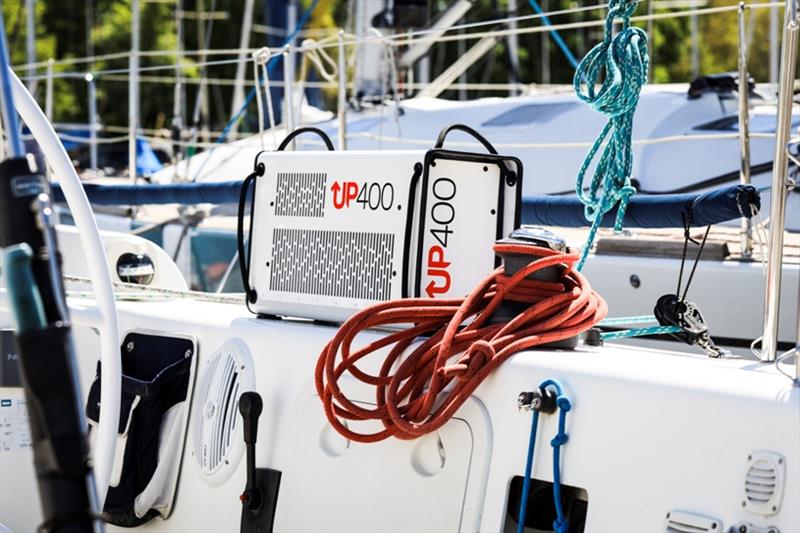
PowerUP Energy covering the whole value chain by developing robust Hydrogen technologies
by Taarini Atal 28 Jul 2021 14:14 UTC

PowerUP's hydrogen fuel cell generator © PowerUP Energy Technologies
Is it possible to connect your generator to other renewable energy sources like solar panels and wind turbines? If yes, have you considered integrating such a technology in the future?
Yes, our generators are designed to integrate with other renewable resources like batteries, solar panels, and small wind turbines and by that create a smart grid system. In fact, we have already started integrating such systems for our customers. In June, we collaborated with Russian sailor Irina Gracheva where she had both solar panels and our generator to power her vessel during her races.
How is PowerUP covering the value chain for hydrogen technologies?
PowerUP Energy Technologies is trying to cover the whole value chain for hydrogen-based technologies. Currently, we are developing hydrogen fuel cell stacks, integrating these into electric generators of different capacities, and at the same time also establishing a robust hydrogen supply chain with help of partners. A good example of this is the launch of the world's first smart hydrogen cabinet which we launched with Alexela in May this year.
How can your newly launched product, the UP400 generator, support a sailors expedition? Do you see sailors choosing hydrogen over other methods of energy generation for their boats?
The UP400 generator allows sailors to extend the range of their energy usage, especially for instances where the sailors are using renewable energy sources that are weather-dependent. A classic example is solar panels. Solar panels need solar energy to generate energy, and this becomes hard to achieve when it's cloudy or during nighttime. During this period, sailors need an alternative to back their energy source and UP400 is ideal for that.
The UP400 can supply electricity when there is a shortage of sunlight or in case of any other power failure. It also helps sailors to reduce the number of batteries installed on their boats. This means they can save weight as less space would be taken up by batteries. Also, in an extreme situation when everything else fails in the middle of the sea the UP400 hydrogen fuel cell generator can be your savior. In fact, the generator is not just extremely reliable and maintenance-free, but is 95% recyclable.
With the current power methods being weather-dependent or lacking efficiency, sailors are turning towards hydrogen. Our UP400 generator uses hydrogen fuel cell technology and comes with added benefits of being lightweight, silent, smell-free, and maintenance-free. These are the main reasons why sailors and the maritime industry have started to already explore using hydrogen instead of other technologies. But at the same time, I believe it's smart not to compare hydrogen fuel cell generators with other renewable sources but rather find it easy to combine hydrogen with other available energy solutions to make an extremely powerup at the same time reliable smart grid system.
Is hydrogen really the fuel of the future? How can it help the Maritime industry?
It is not a question anymore if hydrogen is the fuel of the future. Policymakers across nations have been declaring that hydrogen is the fuel of the future. The green deal being implemented is a good example of that. Using biofuels cannot solve all the issues because they are derived from plants or agricultural waste. Also, they do not work well on current technologies like diesel-based generators.
Earlier with purely fossil fuel-based diesel generators, maintenance was required once a year, whereas in the case of biofuels maintenance is required at least twice a year. Now if we talk about hydrogen-powered generators, they require no maintenance. Additionally, it's the only fuel that restricts the emission of any carbon dioxide as the only by-product is water vapor. Some people also believe ammonia is one of the potential fuels of the maritime however ammonia is just a carrier of hydrogen not as a fuel itself as it will be converter to hydrogen before usage in the fuel cells.
Being one of the biggest polluters, the shipping industry is clearly under pressure to curb its greenhouse gas emissions, which account for approximately 3 percent of the global emissions annually. If you ask me is hydrogen the answer, I would say that's probably the best bet right now. Hydrogen doesn't emit any CO2 nor produce sulfur oxides or any particulate matter.
While the fuel's availability may be daunting, I believe the market is slowly opening up with technologies such as ours, that focus on solving the chicken and egg problem. This means by introducing hydrogen-based technologies in the system, the demand for hydrogen also increases and thus more people are drawn towards it to invest in the fuel.